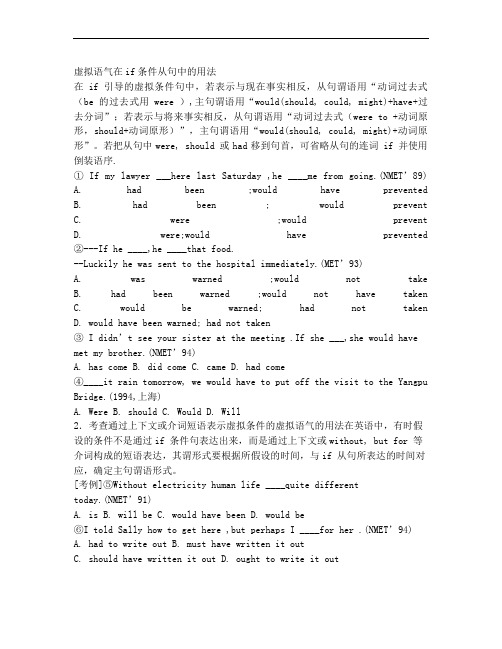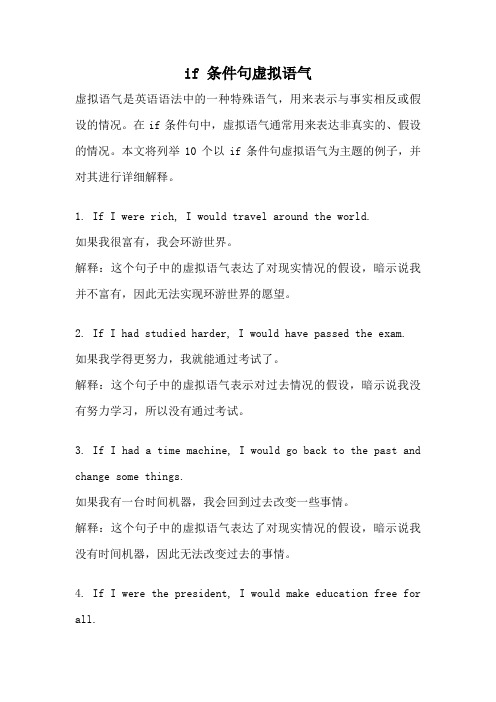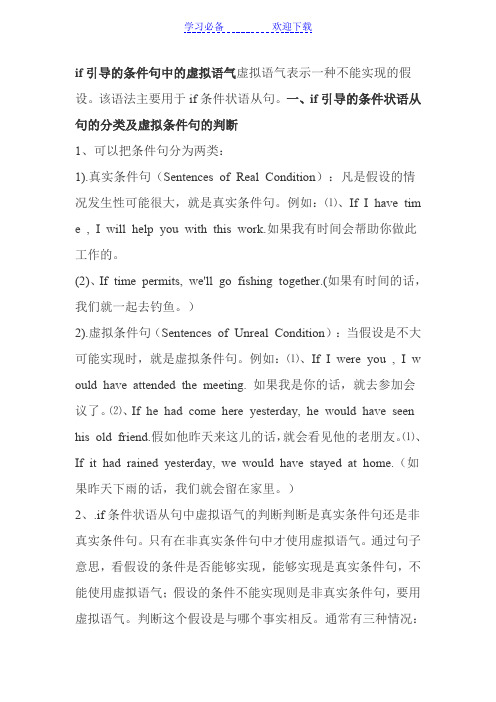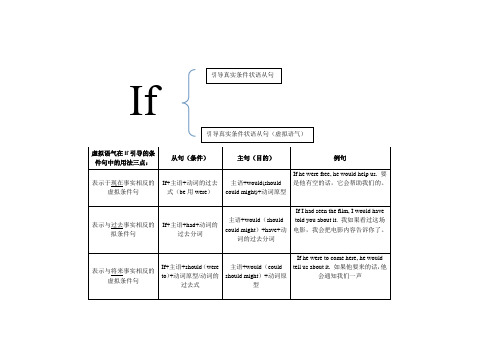公开课-虚拟语气在if条件句中的用法
虚拟语气在条件状语从句中的用法(if条件句)

在写作中的应用
创作文学作品中
在创作小说、诗歌等文学作品时, 虚拟语气可以用来表达虚构的情 节和角色情感,增强作品的情感
色彩和艺术效果。
撰写学术论文
在撰写学术论文时,使用虚拟语 气可以表达假设的情景或条件, 例如在讨论不同政策或方案的影
响时。
写邮件和信件
在写邮件或信件时,使用虚拟语 气可以表达礼貌和尊重,例如在
在撰写商务广告和宣传材料时,使用虚拟语气可以增强语 言的感染力和说服力,例如“假如您正在寻找更好的产品 ,那么您来对了地方。”
感谢您的观看
THANKS
if条件句中的虚拟语气与时间状语从句的时态不一致
总结词
当if条件句中的虚拟语气与时间状语从句的时态不一致 时,通常是为了强调或表达与时间状语从句相反的情 况。
详细描述
在英语语法中,当if条件句中的虚拟语气与时间状语从 句的时态不一致时,通常是为了强调或表达与时间状语 从句相反的情况。这种用法能够使句子更加生动和富有 表现力,突出说话者对某个特定时间点的态度或情感。 例如,在句子"If I had known the answer yesterday, I would have told you."中,虚拟语气"had known" 与时间状语从句的时态"yesterday"不一致,强调了说 话者对过去的遗憾或后悔。
虚拟语气在条件状语从 句中的用法(if条件句)
目录
CONTENTS
• 虚拟语气在条件状语从句中的基本结构 • 虚拟语气在条件状语从句中的用法 • 虚拟语气在条件状语从句中的特殊情况 • 虚拟语气在条件状语从句中的实际应用
01 虚拟语气在条件状语从句 中的基本结构
if虚拟语气的用法归纳

if虚拟语气的用法归纳IF虚拟语气是英语中的一种重要语法现象,主要用于表示与现实相反的假设、愿望、建议等。
它分为两种形式:if条件句和if非条件句。
以下是对IF虚拟语气用法的详细介绍:一、if条件句1. 表示与现在事实相反的假设:If + 主语+ 过去时态,主语+ would/could/might/should + 动词原形。
例如:If I were you, I would go to the party.(如果我处在你的位置,我会去参加派对。
)2. 表示与过去事实相反的假设:If + 主语+ had done,主语+ would/could/might/should + have done。
例如:If he had come to the meeting, he would have known the plan.(如果他参加了会议,他就会知道这个计划。
)二、if非条件句1. 表示建议、劝告:主语+ should/would/might/ought to + 动词原形。
例如:You should go to the party.(你应该去参加派对。
)2. 表示愿望:主语+ could/would/might + 动词原形。
例如:I wish I were a bird.(我希望我是一只鸟。
)3. 表示假设:If + 主语+ 动词过去式,主语+ would/could/might + 动词原形。
例如:If I had time, I would go to the park.(如果我有时间,我会去公园。
)三、if虚拟语气的特殊结构1. 省略if,将were、had、should等词置于主语之前:主语+ were/had/should + 动词原形。
例如:She were here, she would meet him.(如果她在这里,她会见到他。
)2. 使用倒装结构:were/had/should + 主语+ 动词原形。
虚拟语气在if条件从句中的用法

虚拟语气在if条件从句中的用法在if 引导的虚拟条件句中,若表示与现在事实相反,从句谓语用“动词过去式(be 的过去式用were ),主句谓语用“would(should, could, might)+have+过去分词”;若表示与将来事实相反,从句谓语用“动词过去式(were to +动词原形,should+动词原形)”,主句谓语用“would(should, could, might)+动词原形”。
若把从句中were, should 或had移到句首,可省略从句的连词 if 并使用倒装语序.① If my lawyer ___here last Saturday ,he ____me from going.(NMET’89)A. had been ;would have preventedB. had been ; would preventC. were ;would preventD. were;would have prevented②---If he ____,he ____that food.--Luckily he was sent to the hospital imme diately.(MET’93)A. was warned ;would not takeB. had been warned ;would not have takenC. would be warned; had not takenD. would have been warned; had not taken③I didn’t see your sister at the meeting .If she ___,she would have met my brother.(NMET’94)A. has comeB. did comeC. cameD. had come④____it rain tomorrow, we would have to put off the visit to the Yangpu Bridge.(1994,上海)A. WereB. shouldC. WouldD. Will2.考查通过上下文或介词短语表示虚拟条件的虚拟语气的用法在英语中,有时假设的条件不是通过if 条件句表达出来,而是通过上下文或without, but for 等介词构成的短语表达,其谓形式要根据所假设的时间,与if 从句所表达的时间对应,确定主句谓语形式。
if 条件句虚拟语气

if 条件句虚拟语气虚拟语气是英语语法中的一种特殊语气,用来表示与事实相反或假设的情况。
在if条件句中,虚拟语气通常用来表达非真实的、假设的情况。
本文将列举10个以if条件句虚拟语气为主题的例子,并对其进行详细解释。
1. If I were rich, I would travel around the world.如果我很富有,我会环游世界。
解释:这个句子中的虚拟语气表达了对现实情况的假设,暗示说我并不富有,因此无法实现环游世界的愿望。
2. If I had studied harder, I would have passed the exam.如果我学得更努力,我就能通过考试了。
解释:这个句子中的虚拟语气表示对过去情况的假设,暗示说我没有努力学习,所以没有通过考试。
3. If I had a time machine, I would go back to the past and change some things.如果我有一台时间机器,我会回到过去改变一些事情。
解释:这个句子中的虚拟语气表达了对现实情况的假设,暗示说我没有时间机器,因此无法改变过去的事情。
4. If I were the president, I would make education free for all.如果我是总统,我会让教育对所有人免费。
解释:这个句子中的虚拟语气表达了对现实情况的假设,暗示说我并不是总统,所以无法实现让教育免费的目标。
5. If it didn't rain tomorrow, we could go hiking.如果明天不下雨,我们可以去远足。
解释:这个句子中的虚拟语气表达了对未来情况的假设,暗示说明天可能会下雨,所以无法去远足。
6. If I had known you were coming, I would have prepared a meal for you.如果我知道你要来,我会为你准备一顿饭。
英语语法讲解之——虚拟语气

虚拟语气:表示动作或状态不是客观存在的事实,而是说话人的主观愿望、假设或推测等。
If I were a bird, I could fly in the air. 如果我是一只小鸟,我就能在空中飞行。
I wish I could pass the examination. 我希望我能通过考试。
May you succeed! 祝您成功!I.状语从句中的虚拟语气一、虚拟语气在if 引导的条件句中的用法:1. 表示与现在事实相反的虚拟条件句。
其句子结构为:从句:If + 主语+ 动词的过去式(be 用were) + ……主句:主语+ would (should, could , might) + 动词原形+ ……If I were you, I would go with him. If the weather were fine, I would go there.If it weren’t snowing, we wouldn’t stay in the house.If it weren’t for your help, we would get into trouble.If they were here, he would be speaking to them now.2. 表示与过去事实相反的虚拟条件句。
其句子结构为:从句:If + 主语+ had +动词的过去分词+ ……主句:主语+ would (should, could, might) + have +动词的过去分词+……If you had taken my advice, you would not have made such a mistake.如果你听了我的劝告,就不会犯这样的错误。
If it hadn’t been for your help, I shouldn’t have finished this work on time.要是没有你们的帮忙,我就不会按时完成了这项工作。
高中英语if引导的虚拟语气公开课优质获奖课件

Situation3
If we should turn into common people some day, we would live with each other.ary future
If 从句的谓语形式 主句的谓语形式
future
1.should+do
2. did(were) 3. were to do
hands.
Unreal present
☆If we should turn into ordinary people some day, we would live happily with each other.
Imaginary future
Situation1
If I had not pulled the sword out at first, I wouldn’t have fallen in love with her.
★If I _h_a_d_t_r_e_a_su__re_d_ (treasure) her at that time, I _w_o_u_l_d_n_o_t__h_a_v_e_t_a_k_e_n___ (take) so much pain.
▲_H__a_d__I treasured her at that time, I would not have taken so much pain. (如果if虚拟条件句中的谓语部分有had,通常省略if而将 had提到句首变成倒装句)
If 从句的谓语形式 主句的谓语形式
present did(were) would/could/
should/might +do
Classic movie line 2
if引导的条件句中的虚拟语气

if引导的条件句中的虚拟语气虚拟语气表示一种不能实现的假设。
该语法主要用于if条件状语从句。
一、if引导的条件状语从句的分类及虚拟条件句的判断1、可以把条件句分为两类:1).真实条件句(Sentences of Real Condition):凡是假设的情况发生性可能很大,就是真实条件句。
例如:⑴、If I have tim e , I will help you with this work.如果我有时间会帮助你做此工作的。
(2)、If time permits, we'll go fishing together.(如果有时间的话,我们就一起去钓鱼。
)2).虚拟条件句(Sentences of Unreal Condition):当假设是不大可能实现时,就是虚拟条件句。
例如:⑴、If I were you , I w ould have attended the meeting. 如果我是你的话,就去参加会议了。
⑵、If he had come here yesterday, he would have seen his old friend.假如他昨天来这儿的话,就会看见他的老朋友。
⑴、If it had rained yesterday, we would have stayed at home.(如果昨天下雨的话,我们就会留在家里。
)2、.if条件状语从句中虚拟语气的判断判断是真实条件句还是非真实条件句。
只有在非真实条件句中才使用虚拟语气。
通过句子意思,看假设的条件是否能够实现,能够实现是真实条件句,不能使用虚拟语气;假设的条件不能实现则是非真实条件句,要用虚拟语气。
判断这个假设是与哪个事实相反。
通常有三种情况:①与过去事实相反。
②与现在事实相反。
③与将来事实可能相反。
3、“后退一步法”后退一步法是指在准确地判断了该句与哪一事实相反后,按虚拟语气的后退一步法处理从句谓语动词的时态。
If 引导的虚拟语气

If虚拟语气在if引导的条件句中的用法三点:从句(条件)主句(目的)例句表示于现在事实相反的虚拟条件句If+主语+动词的过去式(be用were)主语+would(shouldcould might)+动词原型If he were free, he would help us. 要是他有空的话,它会帮助我们的。
表示与过去事实相反的拟条件句If+主语+had+动词的过去分词主语+would(shouldcould might)+have+动词的过去分词If I had seen the film, I would havetold you about it. 我如果看过这场电影,我会把电影内容告诉你了。
表示与将来事实相反的虚拟条件句If+主语+should(wereto)+动词原型/动词的过去式主语+would(couldshould might)+动词原型If he were to come here, he wouldtell us about it. 如果他要来的话,他会通知我们一声引导真实条件状语从句引导真实条件状语从句(虚拟语气)与将来事实相反的虚拟语气请看下面的题目:If we __________ 200 years old,we __________ everything.A. were to be,could changeB. had been,changedC. were,would have changedD. should be,changed该题考查与将来事实相反的虚拟语气,此时的主句谓语通常用would(should,could,might)+动词原形,而从句谓语可能有以下几种情况:1.从句谓语用过去式:If your father knew this,he would be angry. 要是你父亲知道了,他会生气的。
If it rained tomorrow,the sports meet would be put off. 要是明天下雨,运动会就推迟。
- 1、下载文档前请自行甄别文档内容的完整性,平台不提供额外的编辑、内容补充、找答案等附加服务。
- 2、"仅部分预览"的文档,不可在线预览部分如存在完整性等问题,可反馈申请退款(可完整预览的文档不适用该条件!)。
- 3、如文档侵犯您的权益,请联系客服反馈,我们会尽快为您处理(人工客服工作时间:9:00-18:30)。
Discover2
1.If you had worked hard ,you would have passed the exam . 2.If they had had enough rain last year, they would have gained good harvest. 3.If he had driven more carefully yesterday, he would not have had the car accident.
2.I didn’t see your sister at the meeting. If she__h_a_d__c_o_m_e_______ (come), she__w_o_u__ld__h_a_v_e_m__e_t__ (meet) my brother.
(表示说话人的愿望、假设、猜测或 建议,而不表示客观存在的事实。)
romantic , unrealistic, best wishes
精品
精品
英语动词有三种语气, 陈述 语气,祈使语气和虚拟语气。
陈述语气 (The Indicative Mood):用来陈 述一个事实,或提出一种看法,有肯定、 否定、疑问或感叹等形式。
如果我有一千万,我就能买一栋房子. 我有一千万吗?
没有。 所以我仍然没有房子。 如果我有翅膀,我就能飞。 我有翅膀吗? 没有。 所以我也没办法飞。
如果把整个太平洋的水倒出, 也浇不息我对你爱情的火 整个太平洋的水全部倒得出吗? 不行。
r good wishes or dreams. It is evident that they are not real or they can’t come true
are thinking.
Two-year-old:
If I __c_o_u_l_d__(can) talk, I __w_o_u__ld__te_l_l___(tell) my mother that I hate peas.
14 year-old:
I ___w_o_u_l_d_b_e____(be) happier if I _c_o_u_l_d__(can) drive.
When(时间)
Structure (结构)
与_过_去__事实相反 (现在,过去,未来)
If sb__h_ad__d_o_n_e_(动_词_过__去_分_词_)_…_, sbw__ou__ld精_品_(n_o_t_) _h_a_v_e_d_o_n_e_(动. 词过去分词)
Practice 2
1.I __w_o_u_l_d_h_a_v_e__s_tu_d_i_e_d (study) English when I was a child if I __h_a_d_k_n_o_w__n_______(know) the importance (重要性)of it.
精品
If you had worked hard ,you would have passed the exam .
精品
If they had had enough rain last year, they would have gained good harvest.
精品
If he had driven more carefully yesterday, he would not have had the car accident .
I am not interested in what you said.
Have you ever been to France?
What a splendid palace!
We had many trees planted last year . 精品
祈使语气(The Imperative Mood),用来 表示请求、邀请、命令、警告或劝告等。
精品
If I had a lot of money, I would buy a villa . (别墅)
精品
Discover1
1.If I were a child, I would be happier. 2.If he were a bird , he could fly in the big blue sky. 3.If I had a lot of money, I would buy a villa .
When(时间)
Structure (结构)
与现__在__事实相反 (现在,过去,未来)
If sb_w_e_r_e_/d_i_d_(动__词_过_去_式_)__.,..
sb__w_o_u_ld__/c_o_u_ld__d_o_(_动_词.原形) …
精品
Practice1 Tell what the following people
the sky. I suggest you should follow
your father’s advice . 精品
Subjunctive Mood
虚拟语气在if条件句中的用法
精品
If I were a child, I would be happier.
精品
If he were a bird , he could fly in the big blue sky.
16-year-old:
If I ___h_a_d___(have) a car, my friends and I____co_u__ld__g_o_____ (go) out every night.
19-year-old:
If I __h_a_d__(have) a lot of money, __w__o_u_ld__a_t_te_n_d___(attend) a private(私立的) university.
Let’s have a talk. Don’t jump in the queue. Open the door ,please .
精品
虚拟语气(The Subjunctive Mood)
定义:表示说的话不是事实,或者是不可 能发生的情况,而是一种愿望,建议, 假设。
If I were you, I would go there. I wish I were a bird flying in
